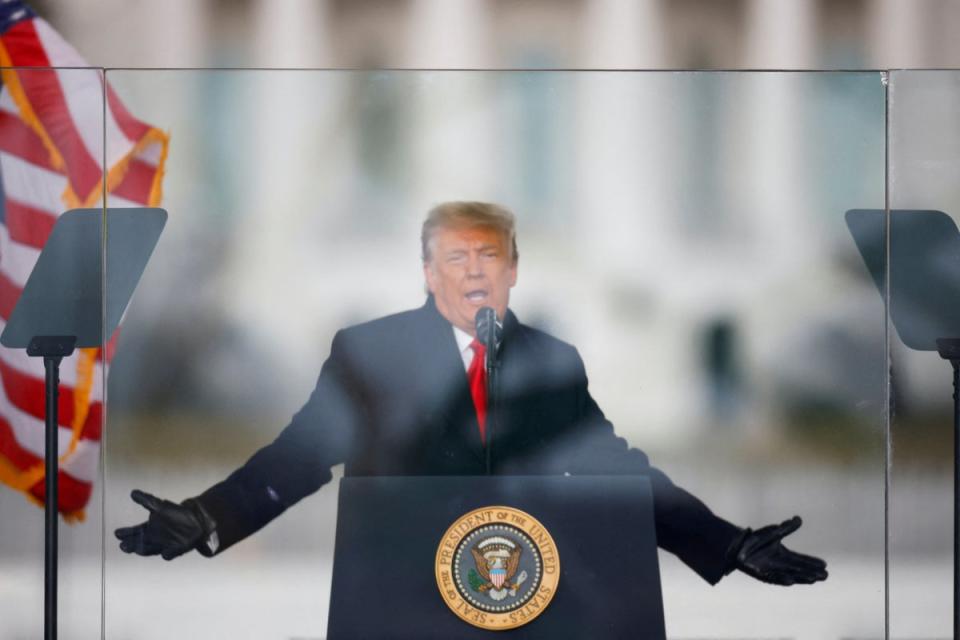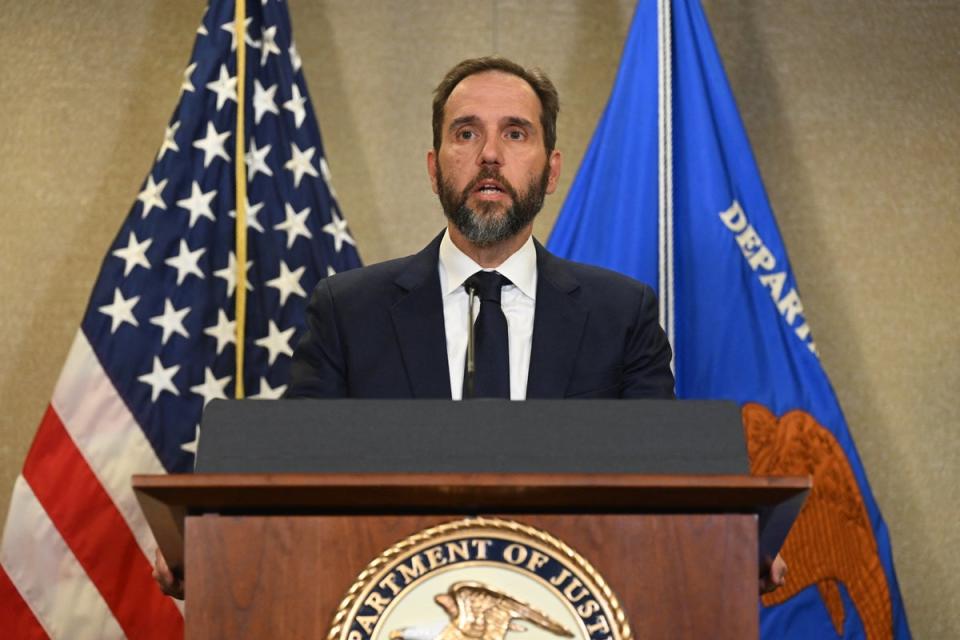Supreme Court weighs Trump’s ‘presidential immunity’ claim. Here’s what that means
Whether or not Donald Trump, and future presidents, are immune from criminal prosecution for actions conducted while in the White House will soon be decided by the Supreme Court.
In what is setting up to be a landmark ruling from the nation’s highest court, the nine justices will determine if Mr Trump’s attempts to overturn the 2020 presidential election results by making false claims of election fraud, allegedly trying to install fake electors and pressuring former vice president Mike Pence to decertify election results were part of his “official acts” as president, and if those are protected from criminal prosecution.
Mr Trump claims he should enjoy absolute immunity, citing previous court cases that have determined presidents have immunity from civil lawsuits brought against them for conduct that occurred while in office.
But special counsel Jack Smith, who brought the four-count federal indictment against Mr Trump, says differently, citing precedent that has determined presidents do not have immunity from criminal judicial proceedings.
Already, two lower courts have sided with Mr Smith but now the Supreme Court will weigh in to the debate.
Oral arguments will take place on Thursday, on the final day of the court’s arguments schedule.
Here’s everything to know about the case:
What’s the case?
Mr Trump’s immunity argument stems from the federal election interference indictment that Mr Smith brought against him last year.
The former president is charged with conspiracy to defraud the United States, conspiracy to obstruct an official proceeding, obstruction and attempt to obstruct an official proceeding and conspiracy against rights.
In an attempt to quash the case, Mr Trump filed a motion to dismiss the indictment to District Court Judge Tanya Chutkan – who is overseeing the case. She rejected the claim leading Mr Trump to appeal to the DC Circuit Court of Appeals.
A three-judge panel upheld Judge Chutkan’s decision leading Mr Trump to appeal, again, to the Supreme Court.

What is Trump claiming?
Mr Trump claims he has absolute immunity, largely based on the 1982 Supreme Court case Nixon v Fitzgerald in which the court found that presidents cannot be sued in civil cases for actions they conducted while in office.
“The President’s absolute immunity extends to all acts within the ‘outer perimeter’ of his duties of office,” the Supreme Court said in Nixon v Fitzgerald.
Mr Trump’s legal team argues that the actions he is accused of leading up to, and after, the 2020 election broadly fall within that “outer perimeter” within his official duties.
Without this, they claim, future presidents, would be subject to “extortion”, “de facto blackmail” and more “at the hands of political opponents.”
Mr Trump has aggressively pushed for immunity in long-winded rants and Truth Social posts.
He claims a president cannot “properly function” or “make decisions, in the best interest of the United States of America” without immunity protections because “presidents will always be concerned, and even paralyzed, by the prospect of wrongful prosecution and retaliation.”

What is Jack Smith claiming?
Plainly, Mr Smith says, Mr Trump – nor any president – is above the law.
In his brief to the court, Mr Smith cites the landmark 1974 Supreme Court case Nixon v United States which decided that presidential privilege does not make the president immune from the judicial process.
He argues that the Founding Fathers never endorsed criminal immunity for a president and outgoing presidents have always known they could face criminal liability for acts conducted in office, citing Gerald Ford’s pardon of Richard Nixon as an example.
He has warned the Supreme Court that awarding Mr Trump absolute immunity, “would prevent Congress from applying the criminal laws equally to all persons – including the President”.
Mr Smith cited other crimes, like bribery, murder, treason and sedition, as examples of things that a president couldn’t be prosecuted for, if the court were to side with Mr Trump
What’s at stake?
The case has the potential to completely shake up both the federal election interference case against Mr Trump as well as the presidency as a whole.
Should the court side with Mr Trump, the federal criminal indictments against him would be dismissed – absolving him of any formal wrongdoing.
It would also award any future president protection from crimes conducted while in office.
Most likely, the Supreme Court will not grant broad criminal immunity protections to Mr Trump or other presidents. If anything, they will issue a ruling narrowly, which could still help the former president delay or dismiss indictments against him after the November election.
A more complicated ruling, that allows presidents to enjoy some immunity from criminal prosecution, could send a decision back down to lower courts, further delaying Mr Smith’s case against Mr Trump.
Already, Judge Chutkan has put pretrial proceedings on hold until the Supreme Court issues a decision.
Mr Trump, a known lover of making any and all motions in attempts to delay his trials, would likely try to appeal his case further.
